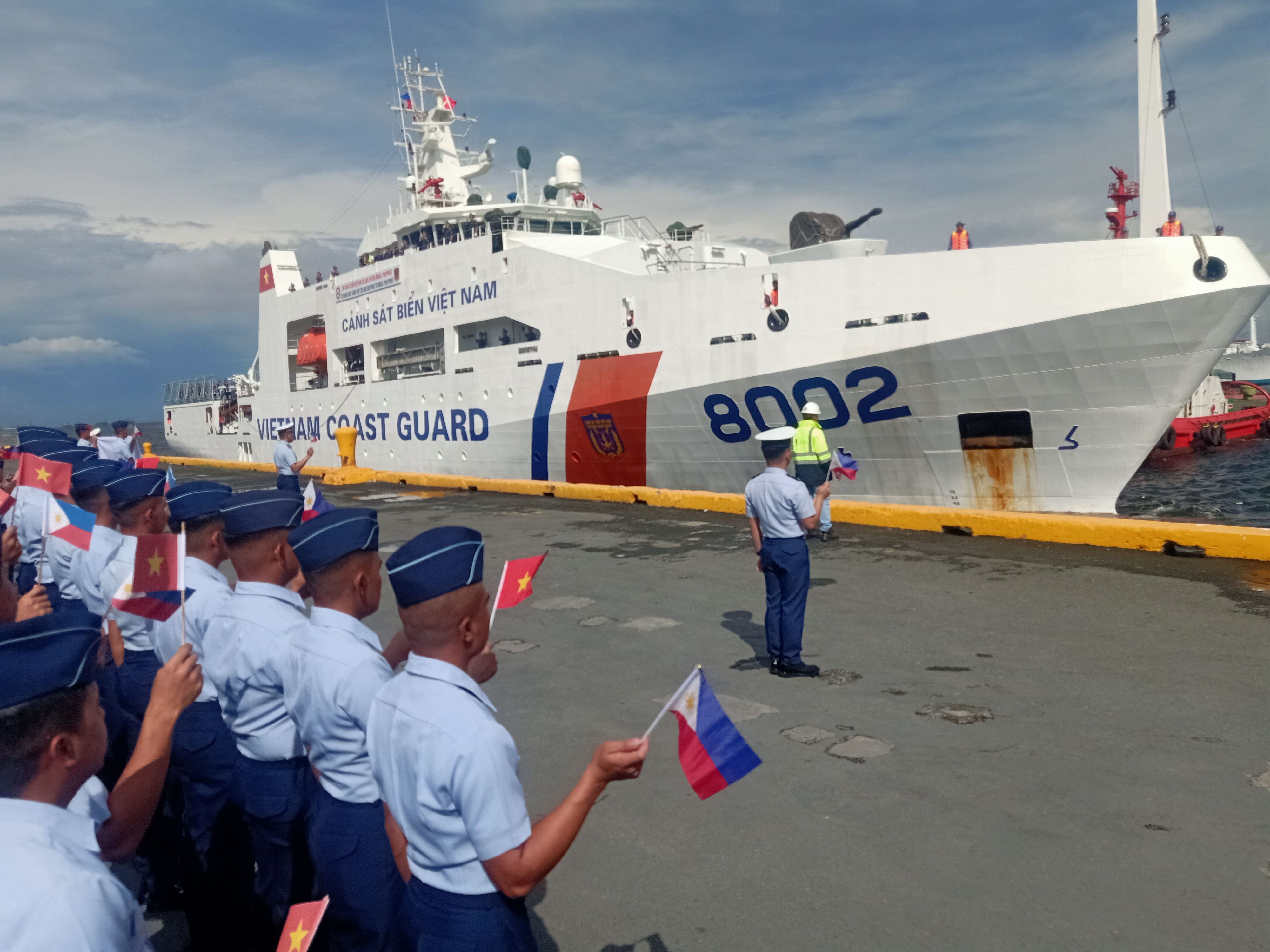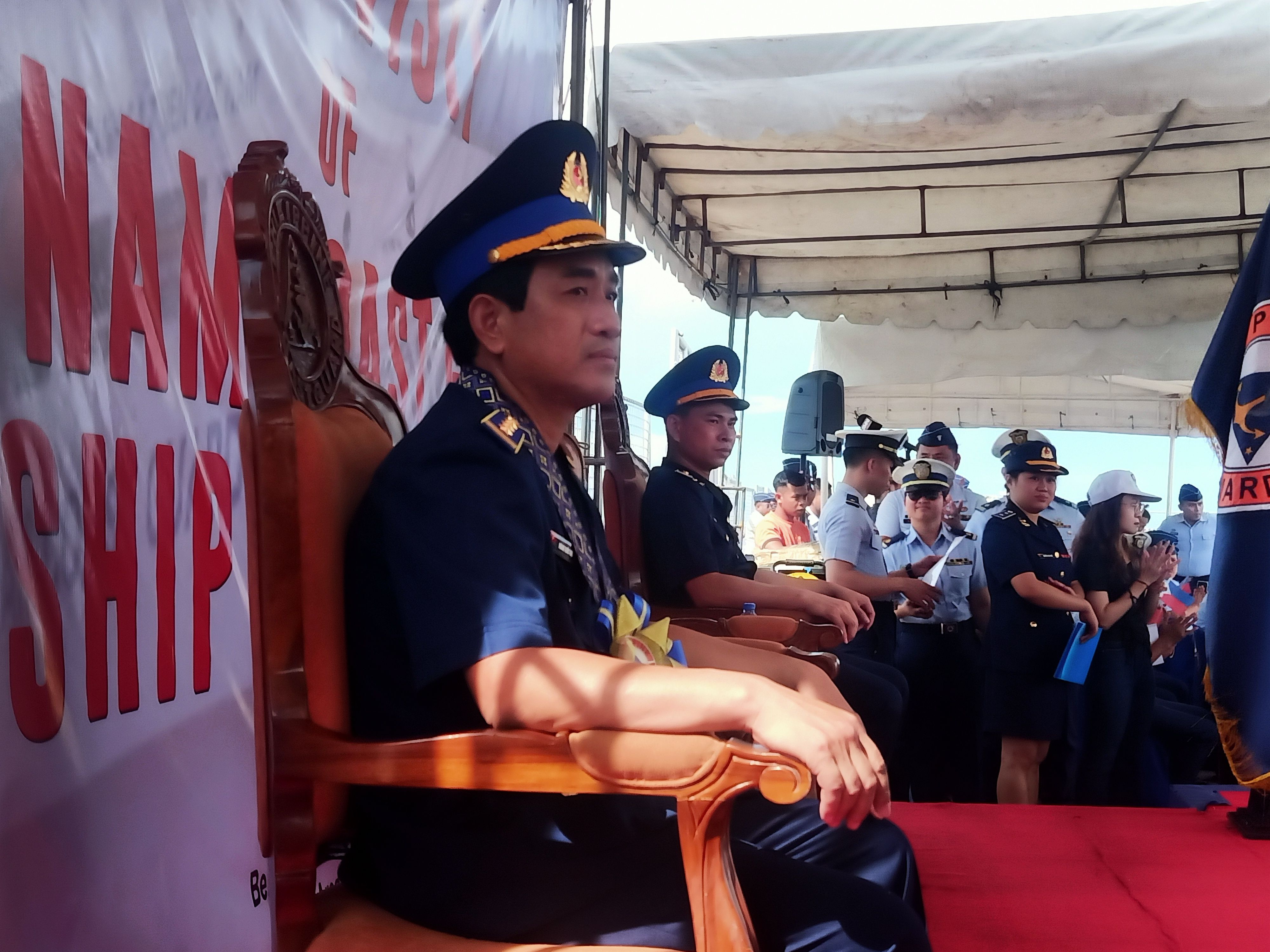Setting aside territorial row: PH, Vietnam to hold coast guard exercise in Manila Bay

The Philippines and Vietnam, which have overlapping territorial claims in the South China Sea (SCS), opted to set aside their differences and chose to strengthen their maritime cooperation as a patrol ship from the Vietnam Coast Guard (VCG) dropped anchor in Port Area, Manila on Monday, Aug. 5, for the VCG's first ever port call in the country.
An approximately 80-member crew of the VCG spearheaded by Colonel Hoang Quoc Dat, VCG Region 2 vice commander, arrived onboard the patrol ship Canh Sat Bien (CSB)-8002. They were welcomed by top officials of the Philippine Coast Guard (PCG) led by Commo. Arnaldo M. Lim, director of Coast Guard Strategic Studies and International Affairs Center, who represented PCG Commandant Admiral Ronnie Gil Gavan.
“This will promote an enhanced efficiency of information sharing and coordination in maritime law enforcement in accordance with international law, thereby, contributing to the preservation and protection of the region’s maritime security and safety,” Colonel Hoang said of the VCG's visit in his speech.
Here in the country until August 9, the VCG delegates paid a courtesy call on Gavan at the PCG National Headquarters after their arrival.
The VCG and PCG will also hold various people-to-people exchanges including a fellowship sports activity, facility visit at the National Coast Watch Center (NCWC) and Marine Science Investigation Force (MSIF) Laboratory, a tour onboard the 83-meter offshore patrol vessel BRP Gabriela Silang (OPV-8301), and a search and rescue (SAR) and fire and explosion prevention training in Manila Bay.
“Alam naman natin na may fishermen tayo at may fishermen sila sa West Philippine Sea (WPS) kung saan ay nakakaencounter sila minsan ng aberya. Isa sa mga activities natin ay magco-conduct tayo ng joint search and rescue exercise na pwede nating magamit in the event na ang dalawang panig ay magkita sa area at mayroong kailangang magtulungan sa pagrescue (We know that our fishermen and their fishermen in the West Philippine Sea sometimes encounter trouble. One of the activities that we will conduct is a joint search and rescue exercise which we can use in the event that both parties see each other in the area and there is a need for rescue),” said Commodore Algier Ricafrente, Deputy Chief of Coast Guard Staff for International Affairs.
In addition, the fire and explosion prevention training will focus on enhanced coordination between PCG and VCG in fighting fire at sea.
The PCG hopes to reciprocate the VCG’s goodwill visit by making a port call in Hanoi in the coming years. Discussions for a joint patrol in the WPS, however, are not considered by the two coast guard forces for now.
Sea dispute
Both Manila and Hanoi have territorial claims in the SCS along with other countries such as China, Brunei, Indonesia, Malaysia, and Taiwan.
In June, the Philippines formally asked the United Nations (UN) Commission on the Limits of the Continental Shelf to recognize its rights on the extended continental shelf (ECS) in the South China Sea, particularly in the western Palawan region, which overlaps with Vietnam’s claims.

The Vietnamese government had said it was willing to talk diplomatically with the Philippines to settle their dispute. In the following month of July, Vietnam made a similar move and filed its own claim for an ECS in the South China Sea.
Both submissions were criticized by China, which has the biggest claims in the disputed waters among all the claimants, covering almost the entire SCS. In 2016, an arbitral ruling invalidated Beijing’s dash-line claims in a victory after Manila protest the former's claims within the latter's exclusive economic zone (EEZ), now known as the WPS.
All of these things happened shortly before the VCG’s port visit to Manila but according to PCG spokesperson Rear Adm. Armando Balilo, the visit should not be seen by any country as a “show of force”.
“Walang kinalaman ito sa anumang usapin ng problema natin sa West Philippine Sea at hindi ito nakafocus doon sa usapin ng issue (This has nothing to do with any talks about our dispute with the West Philippine Sea and this is not focused on such issue),” he said.
"'Yung mga pagkilos base doon sa UNCLOS [United Nations Convention on the Law of the Sea], pabayaan nating umusad (As for the actions based on UNCLOS, let us allow that to move forward) but that will not prevent us from activities like this kung saan ang tingin namin ay makakatulong para mabuild lalo ang relationship namin (where we see that it can help us to further build our relationship [with Vietnam])," the PCG spokesman added.
Balilo stressed that the visit was a way for the world to see that even though Philippines and Vietnam have a territorial dispute, they can still co-exist and get along well.
“Mahalaga ito sapagkat we're building partnership at ipinapakita natin na pwede pala magkasundo ang dalawang bansa na mayroong problema sa West Philippine Sea. Pwedeng magtemplate tayo na magbu-build ng stronger relationship sa mga ibang bansa na may claims. Pwede naman pala magkasundo, pwede magkausap, pwede ide-escalate ang tension sa pamamagitan ng mga ganitong activities (This is important because we’re building partnership and we are showing that it is possible that two countries with dispute in the West Philippine Sea can get along. We can use this as template to build stronger relationships with other countries with claims there. We can get along, we can talk, and we can de-escalate the tension through these kinds of activities),” he said.
It can be recalled that President Marcos Jr. and Admiral Gavan visited Hanoi from January 29 to 30 where they tackled with Vietnamese officials the strengthening of maritime relations of both countries.
During the visit, the PCG and VCG formally signed a memorandum of understanding (MOU) on maritime cooperation which sought to strengthen their understanding, mutual trust, and confidence.
Under the MOU, the PCG and VCG agreed to develop a Joint Coast Guard Committee (JCGC) to discuss common issues and interests and establish a hotline communication mechanism.